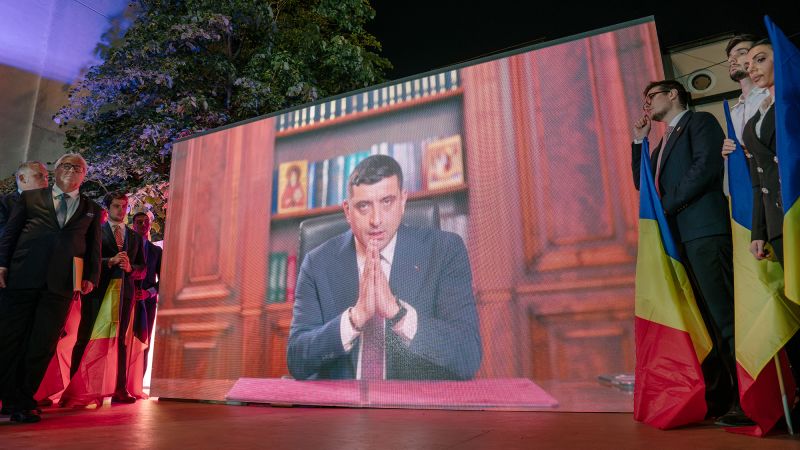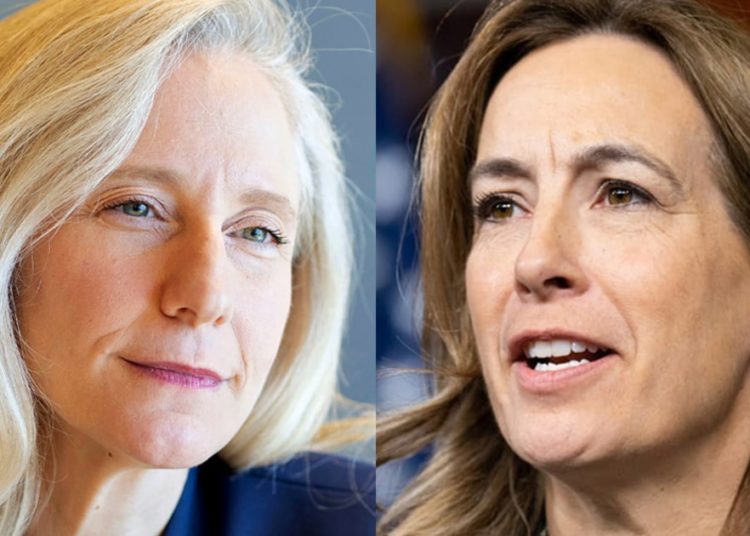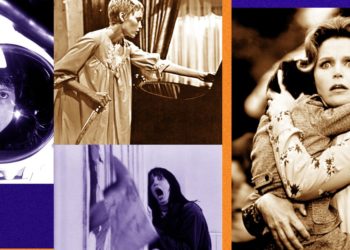On May 4, in the first round of Romania’s presidential elections, far-right candidate George Simion amassed a stunning, but not surprising, 41 percent of the vote, nearly twice as much as the runner-up—Nicusor Dan, Bucharest’s mayor. If Simion wins the runoff on May 18, which is likely, the 38-year-old radical nationalist will determine much of Romania’s foreign policy, including decision-making at the European Union level. His opposition to military aid to Ukraine and his MAGA-style, Romania-first mindset spells more trouble for the EU in Central and Eastern Europe. The administration of U.S. President Donald Trump, on the other hand, is under the impression that it’s winning a soulmate.
Simion’s extravagant ultranationalism is nothing out of the ordinary in democratic Romania—or, for that matter, in the undemocratic Romania that preceded it, including during the era of Cold War communism.
Dictator Nicolae Ceausescu borrowed liberally from Romania’s nationalist traditions when socialism fell short. Though his politics were thoroughly Soviet-style, he broke with Moscow in the 1960s by staking out his own toxic blend of national communism that emphasized Romania’s independence and the primacy of ethnic Romanians, in contrast to the ethnic Hungarians, Germans, and other minorities living in the country. Breaking the ice for him, Ceausescu’s court poets harkened back to the pernicious interwar literati—whose ideas, in their extremist form, constituted the wellspring of the country’s wartime Nazis.
When the regime collapsed spectacularly in Romania’s 1989 Christmas revolution, communism—like Ceausescu himself—was killed off, leaving radical nationalism to blossom into a myriad of parties and movements. They came and went frequently, with labels such as the Romanian Hearth Union, Romanian Nationhood Party, National Rebirth Alliance, Greater Romania Party, and dozens more.
But despite their bitter feuding with one another, these groups shared much: dreams of territorial expansion, anti-Romani racism, loyalty to the Romanian Orthodox Church, antisemitism, and the adoration of Romania’s past dictators—even that great Romanian dictator Ceausescu. In fact, his grave is an attraction to far-rightist admirers, as are sites associated with Ion Antonescu, the “marshal” who oversaw the slaughter of hundreds of thousands of Jews from 1941 to 1944, and Corneliu Codreanu, the founder of the mystical-fascist Legion of the Archangel Michael, which collaborated with Antonescu in the form of the Iron Guard party from 1940 to 1941 and facilitated the regime’s bloodiest crimes.
Simion and his party, the Alliance for the Union of Romanians (AUR), are just the latest incarnation of Romania’s radical right. Simion got his start in politics as a leader of the Romanian national soccer team’s ultras—extreme fans whose membership can include the toughs associated with stadium violence—and cultural groups touting Romanian folklore and conservative values. His passion has long been the unification of Romania with what he considers the rightfully Romanian parts of Moldova and Ukraine. (But thanks to nationalist rabble-rousing in past trips to Moldova, he is persona non grata there and in Ukraine, too.) AUR began as an obscure anti-vaccine party that exploded onto the political scene in 2020, becoming the second-largest party in the parliament in 2024. Its bastions are in the strongly Orthodox rural regions and the 1-million-voter diaspora in places such as Italy, Spain, and Germany.
Neither Simion nor the AUR advocate exiting the EU or NATO—as Romania profits handsomely from both—but they insist on a louder voice within them—a call that echoes Ceausescu’s obsession with national interests as well as the U.S. MAGA movement’s “America First” proclamations. Simion has said that he wants to “strengthen the alliance [NATO] under American leadership” and fight for a Europe free of “unelected bureaucrats”; he compares the contemporary EU to a “new Soviet Union.” His opposition to military and financial aid for Ukraine is a response to Kyiv’s purported mistreatment of its 400,000-strong Romanian-speaking minority.
“I am a Romanian patriot [who] all his life dreamt of being part of the free world,” Simion told the BBC, “and now we discovered that the free world is not that free anymore.”
While Simion shares much in common with Hungary’s Viktor Orban and Slovakia’s Robert Fico, his relationship to Russia and President Vladimir Putin is more ambivalent. Russia is naturally no fan of Moldova uniting with Romania, as Moscow sees Moldova as firmly within its orbit. Moreover, Russia has “peacekeeping” troops in easternmost Moldova in the breakaway statelet of Transnistria.
But Romania and Russia could agree to divvy up the morsel. A May 2025 report from the Institute for the Study of War stated that “Simion’s statements about Ukraine’s and Moldova’s territorial integrity mirror Kremlin claims that parts of Ukraine belong to other neighboring states and that former territories of the Russian Empire and Soviet Union are rightfully part of modern-day Russia.”
Just as Russia most probably intervened to help Simion’s fellow right-winger Calin Georgescu win a first round of presidential elections last year—his victory was repealed for reasons of intransparency and fraudulent reporting—so too do experts see Russia’s footprint on the May 4 vote.
“It fits in as far as Russia supports the extreme left and extreme rights in every election in Europe and the U.S.,” said Mariana Berbec-Rostas, an analyst of Eastern Europe at the EU-funded nongovernmental organization Araminta.
In fact, although many observers view Simion as a milder version of Georgescu, there is little light between them. Georgescu has hailed Putin one of the world’s few “true leaders” and described Romania’s pro-Nazi dictator Antonescu and Iron Guardist Codreanu as “among the heroes of the Romanian nation.” Georgescu parades as a messianic, extreme ultraright opponent of some of the Western values and institutions that Simion supports. But Simion and Georgescu appeared side by side when they voted in Bucharest on May 4. Simion says he is standing in for the unfairly banned Georgescu and has even mentioned that he might propose Georgescu as prime minister, a right that he would have as president. (The candidate would then have to cobble together a functional government.)
The grounds for the upswell in votes for the ultraright extend beyond Romania’s checkered past and Russian meddling. Romanians are, understandably, fed up with a political elite that has enriched itself and the urban upper classes. The post facto banning of Georgescu last year looked to many like a political ruse to circumvent the people’s choice. Although in Central and Eastern Europe, Romania’s economy is second in size only to Poland’s, countryfolk and blue-collar laborers living abroad do not enjoy its perks. At the top of the heap are the extended families of the communist-era secret police, the Securitate, who seamlessly turned knowledge and networks into business enterprises ranging from the media to resource extraction.
“Doubt, anger, and disillusionment are now rippling through Romanian society, chipping away at trust in the system,” concluded political scientist Veronica Anghel in a December piece in the Journal of Democracy.
Moreover, hard-rightist axioms belong to the breadth of Romanian political culture. Just about all of Romania’s mainstream parties feed at the trough of ethnic nationalism and dispense ugly tropes about the likes of the LGBTQ community and Romania’s Roma population.
“The powerful Orthodox Church fuels these kinds of sentiments and recommends its flock to vote for politicians who represent nationalist values and the traditional family,” said German Romania expert William Totok. Figures such as Georgescu and Simion are simply the most raucous purveyors of this concoction at the moment, he said, capitalizing on discontent.
The Trump administration’s involvement in Romania’s domestic politics defies logic, particularly in light of this particularly outlandish stripe of the far right. But Donald Trump Jr. and Elon Musk spoke out for Georgescu last year. After the Romanian intelligence agency announced an investigation into Georgescu’s financial reporting and alleged connections to Russia, U.S. Vice President J.D. Vance, too, scurried to help: “Romania straight up canceled the results of a presidential election based on the flimsy suspicions of an intelligence agency,” Vance said. “You don’t have shared values if you cancel elections because you don’t like the result. … If you’re so afraid of your own people that you silence them and shut them up,” he said in another speech.
Trump Jr. chimed in on Dec. 6 on X: “Wow, look at what’s happening in Romania! The Constitutional Court just canceled the first round of their presidential election. Another Soros/Marxist attempt at rigging the outcome & denying the will of the people,” he posted.
These interjections can only be construed as another attempt by Trump’s inner circle to undermine the EU. And the EU will surely suffer should Romania join Hungary and Slovakia as sprinklers of sand in Europe’s gearbox.
The post Romania’s Far Right Is More Extreme Than You Think appeared first on Foreign Policy.




